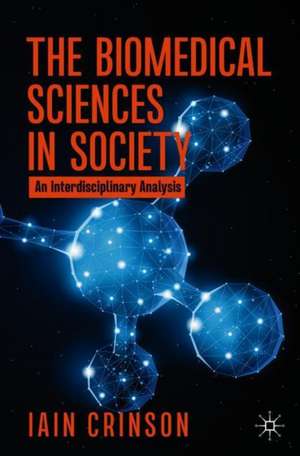The Biomedical Sciences in Society: An Interdisciplinary Analysis
Autor Iain Crinsonen Limba Engleză Paperback – 3 mar 2021
Preț: 389.70 lei
Nou
Puncte Express: 585
Preț estimativ în valută:
74.58€ • 77.42$ • 62.19£
74.58€ • 77.42$ • 62.19£
Carte tipărită la comandă
Livrare economică 22 martie-05 aprilie
Preluare comenzi: 021 569.72.76
Specificații
ISBN-13: 9789811595226
ISBN-10: 9811595224
Pagini: 203
Ilustrații: IX, 203 p. 4 illus.
Dimensiuni: 155 x 235 x 16 mm
Greutate: 0.45 kg
Ediția:1st ed. 2021
Editura: Springer Nature Singapore
Colecția Palgrave Macmillan
Locul publicării:Singapore, Singapore
ISBN-10: 9811595224
Pagini: 203
Ilustrații: IX, 203 p. 4 illus.
Dimensiuni: 155 x 235 x 16 mm
Greutate: 0.45 kg
Ediția:1st ed. 2021
Editura: Springer Nature Singapore
Colecția Palgrave Macmillan
Locul publicării:Singapore, Singapore
Cuprins
Chapter 1: An Introduction to Interdisciplinarity and the Social Studies of Science and Technology.- Chapter 2: An introduction to the Philosophy of Science.- Chapter 3: Laboratory Studies, Epistemic Cultures, and the Routines of Scientific Work.- Chapter 4: The ‘Gaze’ of the Neurosciences.- Chapter 5: The Neuro Enculturation of the Social World.- Chapter 6: Genomics in an era of Personalised Medicine.- Chapter 7: Social Implications of the Epigenetics ‘Revolution’.- Chapter 8: Governance 1 - Trust, Policy, and the Public Understanding of Science.- Chapter 9: Governance 2 - Regulation, Consent, Biobanks and Big Data.- Chapter 10: Gendering Biomedical Science.- Chapter 11: Conclusion.
Notă biografică
Dr Iain Crinson is senior lecturer in the sociology of health and health policy at St Georges, University of London. His previously published books and journal papers focus on the social organisation of healthcare systems, the work of the health professions, and sociology as applied to biomedicine.
Textul de pe ultima copertă
This textbook provides a comprehensive introduction to the interdisciplinary field of the Social Studies of Science and Technology (SSST). Over the past two decades, the biomedical sciences have transformed our understanding of the relationship between the social and natural worlds, while its ‘promissory visions’ are seen to offer extraordinary opportunities for economic and social development. But alongside these scientific innovations have emerged new, and frequently unanticipated social, political, bioethical, and legal dilemmas and challenges. This cutting-edge text explores ‘post-genomic’ developments in the field of pharmacogenomics and the prospects for a new ‘precision’ or personalised medicine; the potential of environmental epigenetics to reconfigure the boundaries of the social and natural worlds; the emergence of an array of ‘neuro-disciplines’, seeking to identify the neural basis of a whole range of social and economic behaviours; and the challenges of constructing a coherent and robust governance framework for the conduct of biomedical science research and innovation, responsive to the social and health needs of the whole population.
Caracteristici
Accessibly written: in an inclusive style that assumes no prior in-depth knowledge of the biomedical sciences. While for those with a depth understanding of the knowledge base of biomedical science, the material presented in this book offers the opportunity to critically assess many of the practical difficulties faced when seeking to apply the findings of biomedical research within the social world The first ever STS-orientated textbook to examine issues around biomedicine, bioscience, and society in broad ways that are suitable for both undergraduate and postgraduate teaching, filling a significant gap in the existing literature An invaluable resource for students undertaking STS-informed modules of study in fields of Science and Technology Studies (STS), Biomedical Sciences & Life Sciences, Innovation Studies, Sociology of Science and Scientific Knowledge, Research Governance & Research Policy, and The Public Understanding of Science
